Anna Sawai Is Shōgun's Not-So-Secret Weapon
The actress discusses the FX miniseries’ climactic penultimate episode and Mariko’s heartbreaking arc.
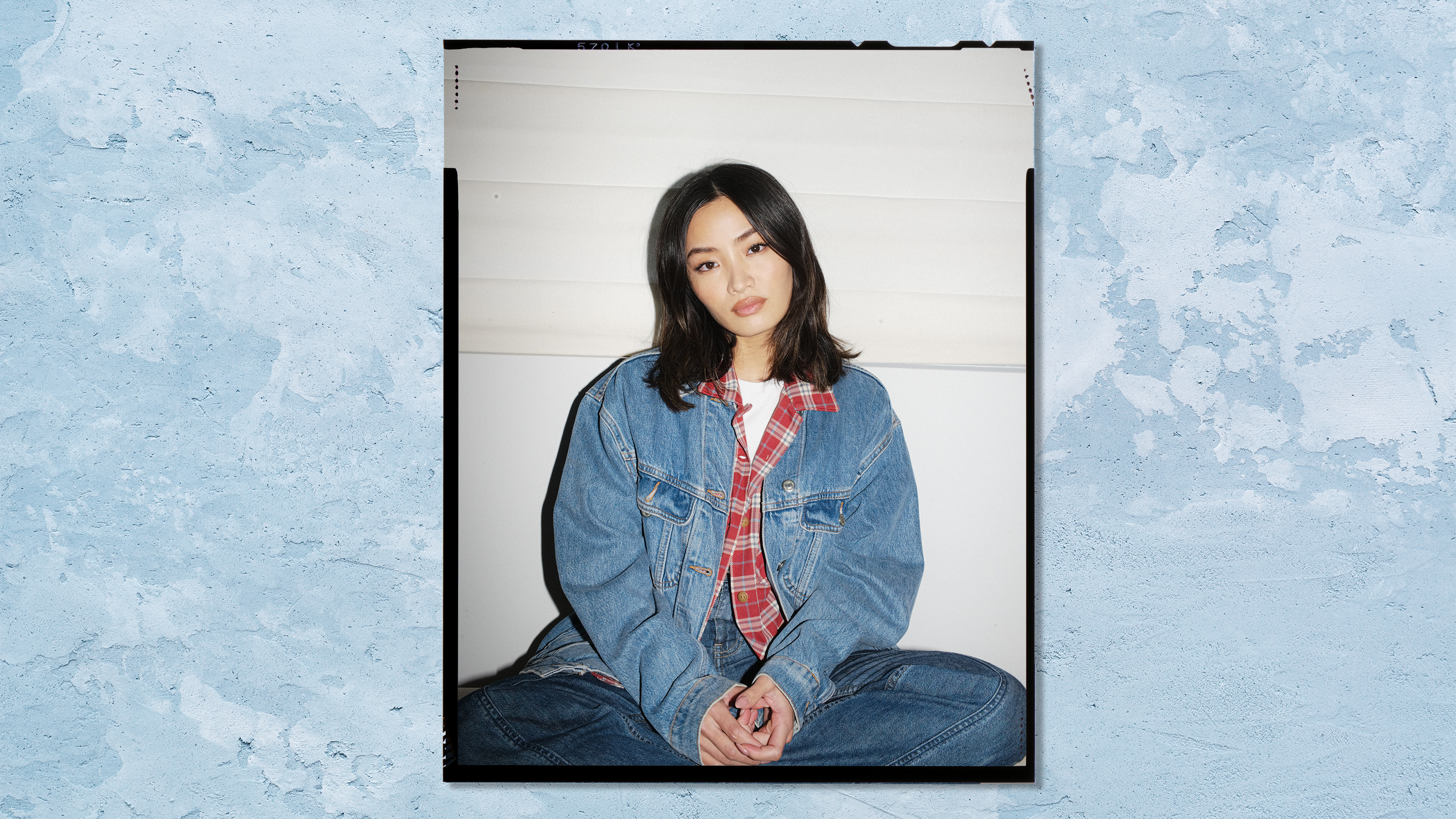
By the final episodes of Shōgun, it becomes unmistakably clear that Anna Sawai has been the period drama’s most pivotal character all along. The critically-acclaimed FX miniseries, based on James Clavell’s 1975 novel, transports viewers to Japan in the year 1600, where rival lords on the country’s Council of Regents are on the brink of war. Sawai plays Mariko, a noblewoman and practicing Catholic, whose lord, Yoshii Toronaga (Hiroyuki Sanada), tasks her with translating for English sailor John Blackthorne (Cosmo Jarvis). Mariko is the picture of a dutiful samurai woman—proper and preternaturally calm, hiding any inner turmoil behind her eightfold fence—and while portraying Mariko, Sawai is able to show the often-unacknowledged strength with which Japanese women have lived for centuries.
Considering Hollywood’s notorious history of diminishing female characters to one-note caricatures, it is a revelation to watch the 31-year-old slowly peel back layers of Mariko’s unshakeable social mask to reveal her nuanced internal world, as she balances her duty towards Toronaga with her deep-seated grief from losing her entire family in the wake of her late father’s disgrace. “Without Mariko and Fuji, Blackthorne could be dead by episode 3 or 4 maybe,” Sawai says, while chatting with Marie Claire over Zoom from her home country, Tokyo, where she's spending some well earned downtime following a whirlwind press tour.
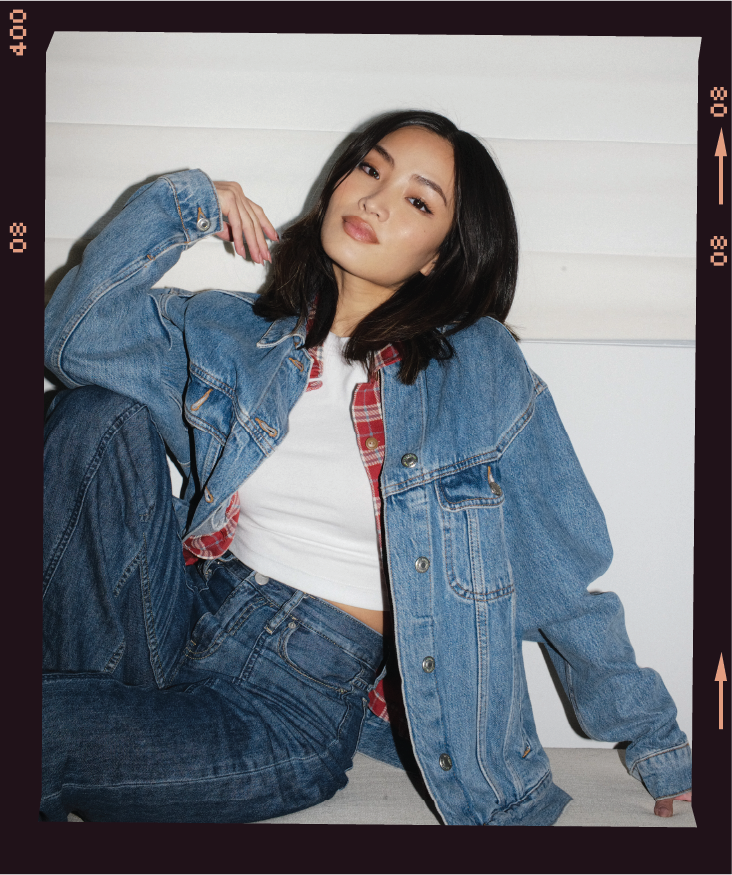
Sawai, 31, portrays Mariko in Shōgun.
Sawai, who cut her teeth with roles in F9 and the Apple TV+ series Pachinko and Monarch: Legacy of Monsters, knows the significance of playing an Asian female character who isn’t reduced to a trope. “A lot of times the women are sidelined, and they're often just mentioned as the love interest of the male figures. In [Shōgun], they really have their own story… You see what they're going through and how much power they actually have.”
Below, the actress speaks with Marie Claire about Mariko’s heartbreaking arc in episode 9, the period-accurate details she learned to portray a female samurai, and how one of her dreams actually influenced Mariko’s reunion with her childhood friend, Ochiba.

Lady Mariko (Anna Sawai), in the penultimate episode of Shōgun.
Marie Claire: What attracted you to the role of Mariko, and to working with [show creators] Rachel [Kondo] and Justin [Marks]?
Anna Sawai: I was really moved by Mariko's story and the fact that she's based on Hosokawa Gracia, who actually lived in Japan in 1600. We really see this quiet strength. To be able to give voice to the Japanese women was a huge thing for me, because oftentimes, it's just like, 'Japanese people are very cute and submissive and maybe nerdy,' but it's so one dimensional. For someone who doesn't know Japanese culture, it might be fine, but a lot of times when I see the depiction of Japanese women, I never really felt like it was reflecting me. Finally with Mariko, it felt like, ‘Okay, this character feels real.’ Justin and Rachel made sure that they were going to do this right, and that it felt right for me as a Japanese woman. They were very respectful to the Japanese supervisors who came on board, the people who were playing the characters. They made sure that it was all properly done.
A lot of times when I saw the depiction of Japanese women, I never really felt like it was reflecting me. Finally with Mariko, it felt like, ‘Okay, this character feels real.’
How deep did you get into the research? What was it like balancing the real-life historical figures the show was based on, but also knowing that Mariko is a fictional interpretation?
AS: I did my research on Hosokawa Gracia-san because I really wanted to know the core of her, but at the same time, I knew we weren't making a documentary on her. The names are different, for a reason—they're fictional characters. So it was a nice kind of guideline. But I think I definitely focused more on Mariko in the script. I talked to Rachel, because Rachel had been working on this project for many more years than me, even way before I got on board. Talking to her about why she wanted to bring Mariko to life; to give more voice to her was very important to me. What I received from [Rachel] was huge, and she is the reason why Mariko is so powerful.
Get exclusive access to fashion and beauty trends, hot-off-the-press celebrity news, and more.
I've watched the behind-the-scenes footage which showed the several experts on set for everything, down to gestures and movements including how to hold chopsticks differently. What was the most minute thing you had to learn how to do for the show?
AS: Going down the stairs, or walking on the stones... usually in modern day, you would just walk one step forward [each time]. Back then, you would have to put your left or right foot forward, and then you would put your other foot next to it. You would have to walk like that, and it was so time consuming. On days that they were trying to shoot a wide shot like we're walking into the house, it took three minutes to get into the house. Even just sitting down, there were different styles to it. If you're wearing a kimono, you're sweeping your hands underneath your knees and then sitting. Whereas if you're wearing a hakama—which is like pant-style; you'll see Mariko wearing it when she's on a horse or on the battlefield—she'll kind of hit her knees with both of her hands and then sit down. Even when I was crying and I wanted to wipe my nose—because I cry from my nose—they were like, ‘You're not supposed to put your hand like that. You have to take out the little sheet that's in your pocket and you have to fold it a certain way.’ I was like, ‘I can't do that. I'm just going to let it dribble.’ Everything's very specific.
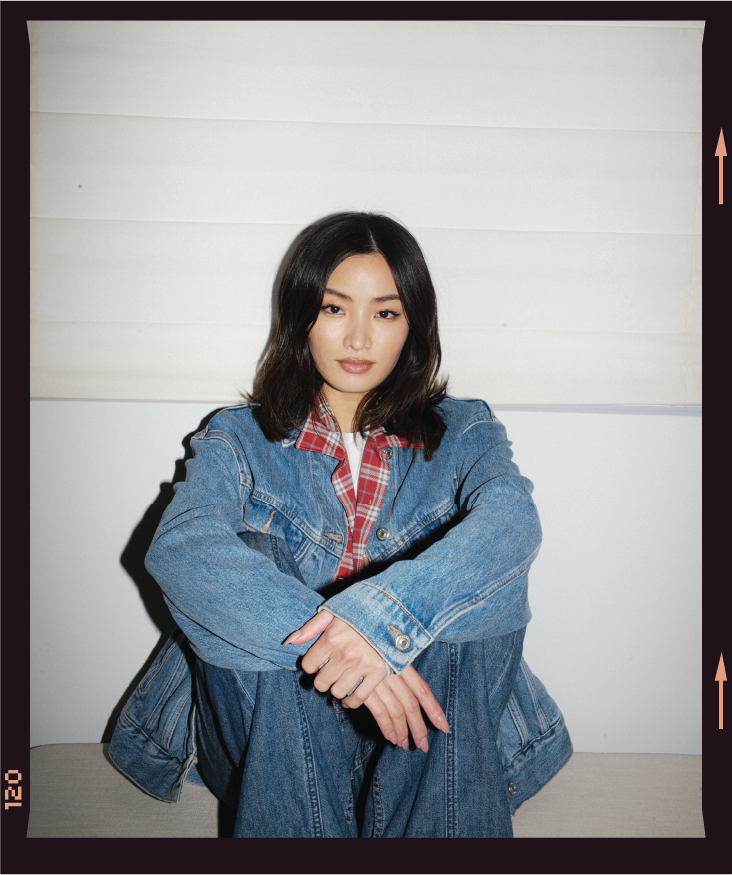
"To be able to give voice to the Japanese women was a huge thing for me," Sawai says of being in the FX miniseries.
After filming, was it weird going back to real life in modern-day Japan, while still having the period dialect and all those specific gestures in your head?
AS: It wasn't weird because, obviously, I would go back home, and I would be in my modern day PJs, and seeing Japanese people... they're not all talking the way that we talk on the show. I think it gave me so much more appreciation and understanding of why we're the way we are. They had to cut the tea scene [between Mariko and her husband Buntaro in episode 8] a lot—it was a 25 minute scene originally—but in the end, after the tea ceremony, we had a shot where she flips the cup and just admires the design and the way it's made. There's no words shared between Buntaro and Mariko, but you see that Japanese people have appreciated moments that way: in silence, giving their time to observe it, rather than saying a lot. So when people don't say too much, I think right now I'm much more appreciative of it.
You've had multiple lives in your career between being a pop star and an actor, and you also moved around a lot as a kid between New Zealand, Japan, and Hong Kong. Mariko also embodies a similar fluidity in terms of being both a Christian and a samurai. As you crafted the character, did you find yourself relating to Mariko, and as she says in the premiere, having “more than one heart”?
AS: It really felt relatable to me. I am Japanese, but I'm not like [most] people. Japanese people will look at me and say that I seem a little bit mixed in some ways, not in how I look, but in how I carry myself. I think Mariko definitely had these different faces which were kind of contradicting at times, because of the way you serve your lord. You will even give your life to serve your lord. Whereas, if she's a Catholic, you can't wish to die. I'm not religious like that, so I did have to do my research, and I did talk to Rachel who had a better idea of it. In the end, it made a lot of sense to me that Mariko wanted to die, and then she found Catholicism and she was saved by it. She was able to find more meaning in her life, but it could have been anything. It didn't have to be Catholicism; she's not into the politics and the money. She's just into it because it gave her meaning. Realizing that there could be something that really changes the way that you look at life, and questioning what that meant for me, made me understand what it was to be a Catholic and a samurai.
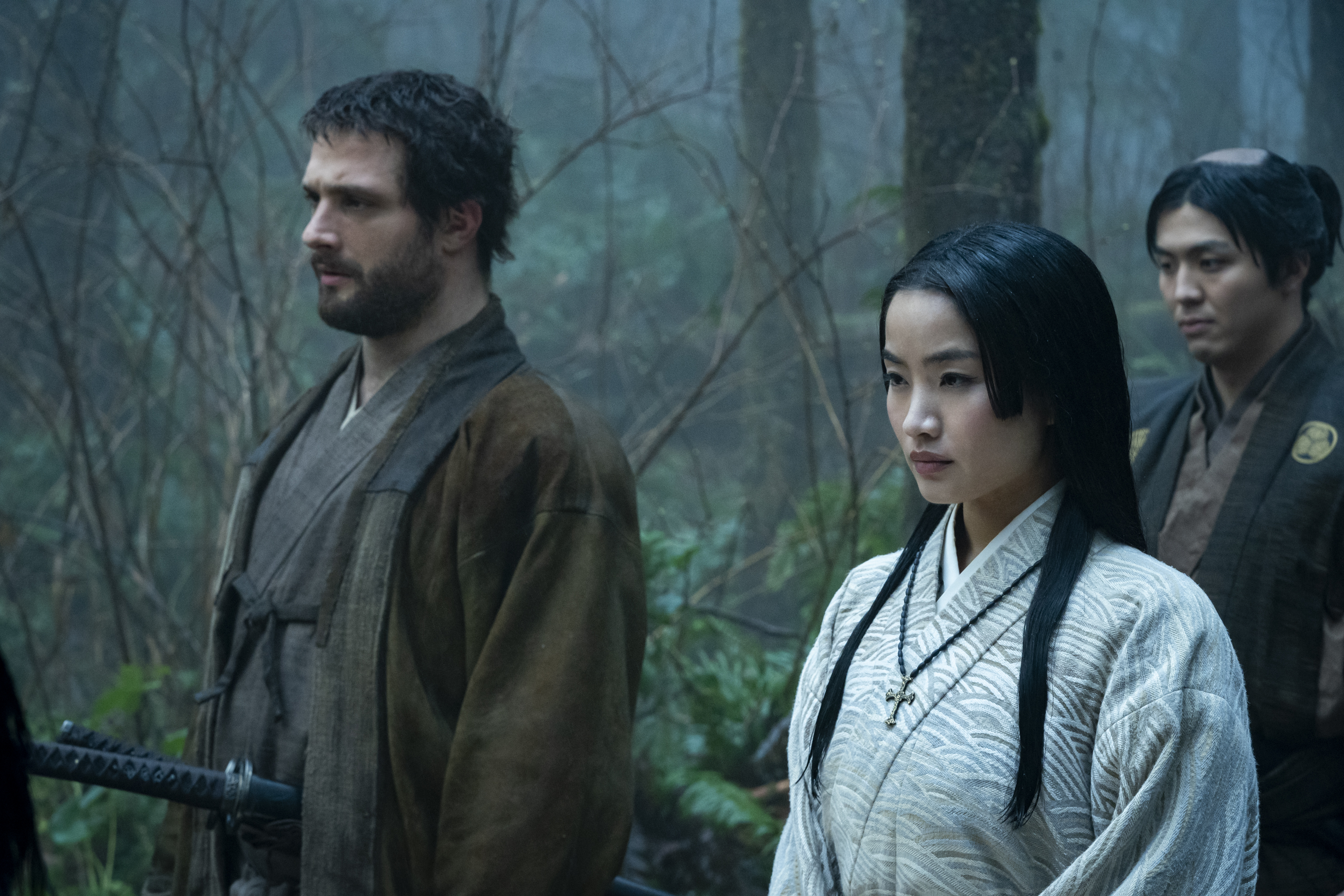
John Blackthorne (Cosmo Jarvis) and Mariko (Anna Sawai), in episode 7 of Shōgun.
Her relationship with John Blackthorne could have been a trope that has played out for far too long in the media—the sexualization of Asian women—but instead it's very authentic and nuanced. What do you think are the elements of Blackthorne that intrigued Mariko the most?
AS: I think that he is the first person who makes her feel just human, not being seen as a woman, and not having to close her mouth in front of him. If anything he's like, 'Tell me, what are you thinking?' He's so accepting of everything. It's definitely not what she thought she was going to find. The relationship that they make is not what she expected. But I think that it's because she approaches him in the beginning as someone she doesn’t really care about. She doesn’t need to impress him, or give respect to him like she gives respect to the Japanese men. That allows her to be herself, and as he sees that, he’s so accepting of it.
What I love about the relationship is that the romance seems like a by-product. It's not the main focus, and that's not the point of her character. It's that they have this very human connection in the hot spring scene, and they're allowed to connect on a very deep level as just human beings. Then they have this beautiful sequence of their imaginary day in London. Mariko knows that she'll never have that, and I think Blackthorne understands that as well, but they’re sharing this ideal day that they would spend together. And then, after being accepted and feeling seen, that’s when the romance starts to ignite. I love that it’s more of a human connection.
What I love about the relationship is that the romance seems like a by-product. It's not the main focus, and that's not the point of her character.
In my opinion, it actually isn't Blackthorne who is the major relationship for Mariko. It's Ochiba. I love how the major turning point of the show is just getting these two women, who have been torn apart by male influence over their life, to actually reconnect. What was it like playing that episode 9 scene with Fumi Nikaido where Mariko and Ochiba finally talk?
AS: I just remember feeling like, I miss you. By that point, Mariko was like half of me; half of me was made by Mariko. Before shooting that scene, I had dreamt of my childhood friend who I have no contact with anymore, and I don't even know how to reach her. But in the dream I was like, I wonder what happened to us. What made us grow apart? And then waking up, I was like, That was so random. I haven't even thought about her in years. Then I opened the script and realized that that was what Mariko was going through with Ochiba. I stepped on set remembering my friend, and just looking into Fumi's eyes and realizing that what's coming out of her mouth is very sharp, but that she is trying to stop Mariko because she cares about her friend. That was very bittersweet. Fumi was just such a great scene partner. I received so much from her. I loved shooting that scene.
I know that a lot of the draw of episode 9 is that Mariko gets to actually fight—go full badass—and take a lot of her agency from behind the scenes into the forefront. What fascinated me is how she balanced anger and also peace with death. How is Mariko feeling when she arrives at that emotional place?
AS: The leaving the castle scene is the only scene where she's actually able to fully express what's going on inside. Even the scenes that come afterwards, they may feel like a release, but it's still constrained in a way. I feel like everything that she had been through was coming out in that scene. [My performance] wasn't really anything calculated. It was more just a visceral feeling going into the scene and then holding that naginata [blade], and seeing the lords upstairs just watching. Everything just landed in the way that it should have. I allowed Mariko to freely express it all, which was really nice, because in every other scene it's all very stoic and covered and concealed. I also think that the decision she makes [to die] is not made in that scene. It's made in the scene in episode 8 where she sees Toronaga-sama, for the first time, really [broken] down and grieving his friend. She realizes that that was all part of his plan, and that he was about to give her the next role to play out like Hiromatzu did. That was the pivotal scene, and I think people are only seeing the transformation in the naginata scene.
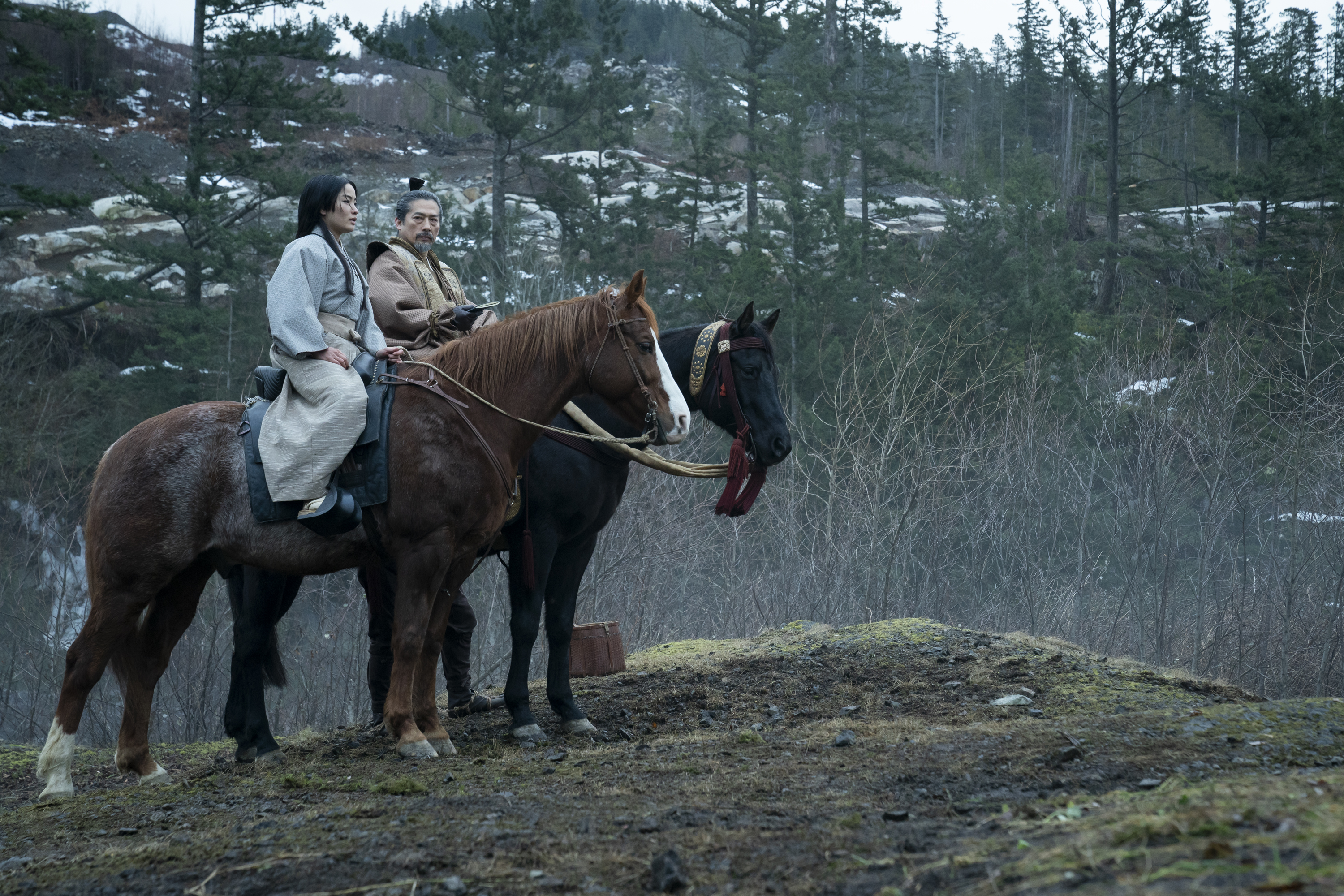
Mariko (Anna Sawai) with Lord Toranaga (Hiroyuki Sanada), in Shōgun episode 4.
Do you believe that Mariko felt in her final moments that she was truly able to honor her father?
AS: I would like to think so, yes. When she is tasked with this role from Toronaga-sama, she realizes that she's going to serve her lord and also fulfill what her father wanted, which was for her to finish this battle. I think she doesn't realize that that is the way it's going to happen. She can’t read that they're going to get attacked during the night and that was going to be her final moment. But she realizes that during the course of leaving the castle, something could happen, and if anything is about to happen, then [she] is going to make it a statement. In the final moment, I think she definitely knows that her decision is allowing her to follow her father and his will and also fight against the injustice.
Though episode 9 is the end of Mariko’s story, it would be lovely to spend more time with the character. Would you ever return to the world of Shōgun in some way, like maybe exploring Mariko’s past?
AS: Yeah! I love Mariko so much that if there was more that I could explore, I would do it in a heartbeat. But I think that her story is now complete, and I don't know if anyone should be trying to like touch that. It's kind of perfect the way it ended. If there is a prequel then yeah, it would be when she's younger, and I don't know if I can play her younger.
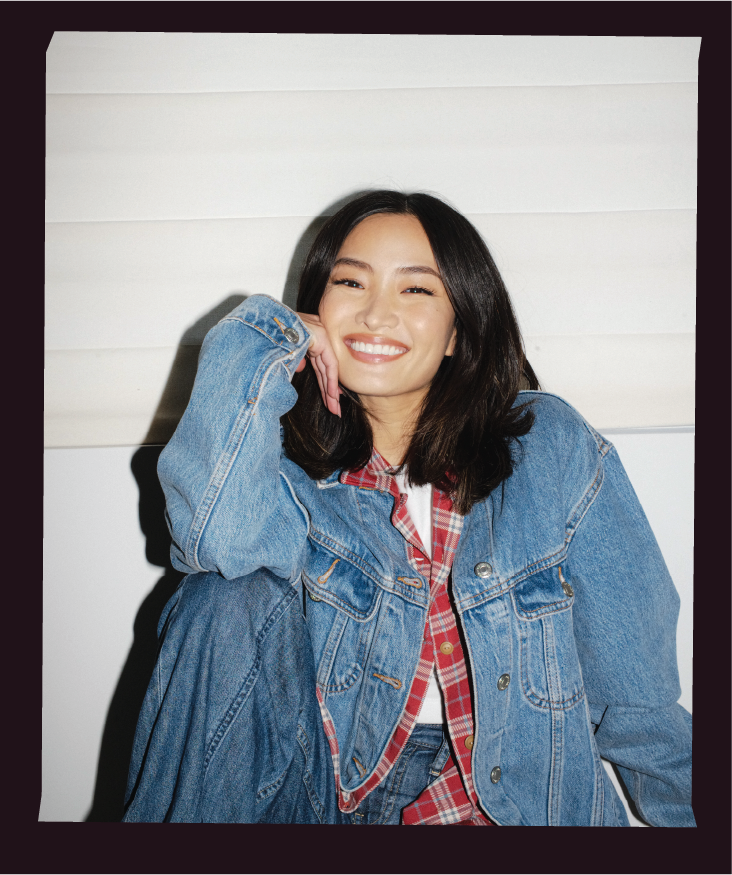
Sawai calls Tokyo home and has been working in the Japanese entertainment industry since she was just 11 years old.
How has the journey of playing Mariko impacted you? How do you hope that your portrayal of this woman will impact viewers of the show?
AS: It definitely made me think about my life and what I'm doing here; I had this whole life crisis last year. I think it will allow the viewers to think about that. This is really what Japanese women went through, and still there is the shadow of that [history] in modern day Japan. I think [Shōgun] will really inform people that Japanese women are not simple. They're very complex, and even if it's not shown too much, there's so much going on. You don't know someone's story unless you really sit down and talk to them. I hope that there's more respect for Japanese women, because I feel like a lot of times it has felt more surface level. I will carry Mariko with me for the rest of my life, because really she is that powerful. She has that strength. I just hope that people are able to really reflect on their lives and how they value it and how they want to live it.
This interview has been edited and condensed for clarity.
Quinci LeGardye is a Culture Writer at Marie Claire. She currently lives in her hometown of Los Angeles after periods living in NYC and Albuquerque, where she earned a Bachelor’s degree in English and Psychology from The University of New Mexico. In 2021, she joined Marie Claire as a contributor, becoming a full-time writer for the brand in 2024. She contributes day-to-day-content covering television, movies, books, and pop culture in general. She has also written features, profiles, recaps, personal essays, and cultural criticism for outlets including Harper’s Bazaar, Elle, HuffPost, Teen Vogue, Vulture, The A.V. Club, Catapult, and others. When she isn't writing or checking Twitter way too often, you can find her watching the latest K-drama, or giving a concert performance in her car.